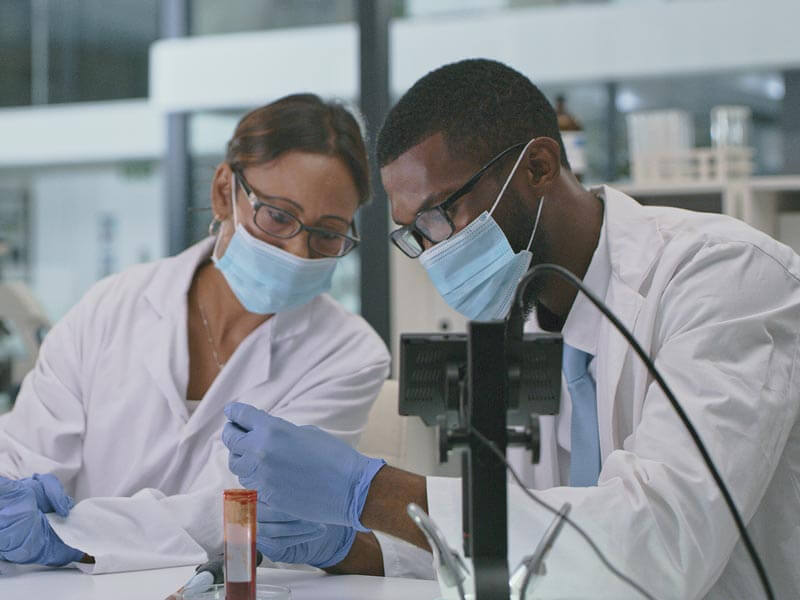Support the Institute for Basic Biomedical Sciences
Online
Donate online to partner with us on our quest to find the next treatments and cures.
Over the Phone
Call to speak with us about making a gift at 410-502-1876.
Send via Mail
Download our giving form to mail in your generous donation.
Types of Gifts
-
Gifts of all sizes help the Institute for Basic Biomedical Sciences (IBBS) to continue our ongoing efforts as a leader in innovative and compassionate treatment, groundbreaking research, and excellent surgical medical education. Gifts made with a check or credit card provide immediate support to the Department.
Contributions to the Institute for Basic Biomedical Sciences (IBBS) can be unrestricted and used where the need is greatest. Gifts can also be designated to support a specific doctor. Gifts can also be made in memory of a loved one or to honor someone special in your life.
Gifts can be made outright or pledged over a period of up to five years.
-
Many employers offer a matching gift program to their employees. For every dollar you donate to the Institute for Basic Biomedical Sciences (IBBS), your employer will match it either dollar for dollar, two dollars to one dollar, or, in more generous cases, three dollars to one dollar. All you need is a Matching Gift Form from your employer’s Public Affairs Department. Complete the section designated for employees and mail the form to us. We will take care of all the other details and paperwork.
-
There are many opportunities to commemorate family members, friends, or colleagues on a birthday, anniversary, or another special occasion. Gifts can be made to the Institute for Basic Biomedical Sciences (IBBS) in honor of a special physician, for example, who has played a significant role in your health. These gifts are greatly appreciated by the people being honored and their families.
A gift made to the Institute for Basic Biomedical Sciences (IBBS) in memory of a person who has passed away is a special way to honor a beloved friend or family member. Such a gift creates a legacy and memorializes the person by providing direct support to the Department.
-
Gift planning allows our donors to thoughtfully choose ways of giving that meet their needs—and the needs of the Institute for Basic Biomedical Sciences (IBBS). A development director from the Department and the Johns Hopkins Institutions, Office of Gift Planning can provide you with information on effective charitable planning options so that you can achieve optimum tax, financial, and philanthropic results.
Diversity and Inclusion Programs
-
A major challenge that all graduate programs face with respect to diversity and inclusion is the need outcompete rival programs in attracting highly talented Ph.D. applicants. We aim to create a dedicated funding mechanism that can be used to help basic science graduate programs recruit outstanding diverse candidates. To have a widespread impact, we would be looking to support 15-20 such fellowships across all graduate programs in the basic sciences each year.
-
People underrepresented in science who are applying for undergraduate or graduate slots often have not had the opportunities afforded to their peers, and thus can be inappropriately considered to have fewer qualifications. In a head-to-head match against more ‘typical’ students for a limited number of coveted admission slots, underrepresented applicants from less traditional backgrounds will frequently lose out to applicants that attended the ‘right’ schools or established high-level connections through pre-doctoral research. Although persistent cuts to basic science funding over the past two decades have exacerbated this problem into a zero-sum game, programs should not be faced with having to make a decision between an intriguing ‘non-traditional’ underrepresented candidate and a ‘sure-fire’ non-underrepresented candidate. A key solution to alleviating this problem is to create student support exclusively for non-traditional diverse applicants. We seek to cultivate either private donors or industry sponsors to create named studentship fellowships that would support the full stipend of such candidates.
-
Careers in Science and Medicine is a pipeline program that develops students (‘scholars’) from low-income and educationally under-resourced backgrounds into successful professionals. Scholars specifically have an interest in pursuing health care, biomedical and STEM careers. Pre-doctoral outreach programs are an essential to building healthy diversity in the graduate ranks. Basic science faculty currently manage several such programs, which consistently face difficulties in raising funds to maintain viability. The annual costs of these programs vary depending on their size and the types of opportunities they afford. Specific details can be provided on request.
-
Research Fellows’ programs take the place of a traditional post-doctoral fellow position to enable the best and brightest talents to independently pursue their research ambitions straight from graduate school before seeking a faculty research position. Established fellows programs (e.g., Harvard, UCSF, Berkeley Miller) have a record of nurturing some of the most creative and exciting young scientific minds in the field; however, there currently exists no such program exclusively focused on supporting this talent from diverse or underrepresented groups. We have created an IBBS Fellows Program that provides salary support for individuals of outstanding promise and potential. Fellows would conduct independent research straight out of graduate school in a sponsor’s lab for a period of 3-5 years in lieu of a traditional post-doc.
Reasons to Gift
-
Janie Elizabeth “Liza” Bailey, a member of multiple boards at The Johns Hopkins University who also happens to be a descendent of one of its founder’s siblings, looks at “a very long time horizon.” For her, that’s a large part of the appeal in giving to the Institute for Basic Biomedical Sciences: Discoveries that unlock basic biological principles won’t affect medical practice this year or next, but they are crucial in laying the foundation for future breakthroughs. “I was happy to give to something that I felt would be unique but for which it’s very hard to raise money,” she says.
And it’s not just the research itself that lays a foundation, Bailey says. “Promoting young scientists so they can establish their careers bears so much fruit over time,” she says. “It’s an area where Hopkins excels, in part because the interaction among people who are there now is so rich and fulfilling. It’s a great environment.”
One area of the institute’s research that Bailey finds particularly interesting is centered on telomeres, which protect the ends of our chromosomes and shrink as we age. This research, led by Carol Greider and Mary Armanios, provides insights into “how and why we age—questions with big implications for the health care system and for society as a whole,” Bailey says. “Mary’s work also involves telomeres’ role in rare but terrible diseases. It touches not only on causes, but also on possible treatments.”
That’s true, ultimately, of all of Johns Hopkins’ basic biomedical research. “I think if we can have a breakthrough in one area, there is great potential in terms of health care and impact on patients,” Bailey says.
-
Researchers give their thoughts and insights into the importance of donating to future research in this video.
-
When the Johns Hopkins University School of Medicine was founded, the unusual mandate was that the field of medicine be treated as a form of graduate study and to include scientific research, and physicians and scientists were thought of as one and the same. Despite tremendous growth, advances in technology, and changing pressures in health care, the link between medicine and scholarship remains unbroken at Johns Hopkins even today.
IBBS reinforces this link by fostering a collaborative environment that bridges basic science and clinical research. The eight interdisciplinary IBBS centers bring together experts from various science and medical backgrounds to study topics, such as metabolism and obesity, pain, autism, and mental illness, in innovative ways. IBBS researchers are adopting new technologies; building tools and using them to track cells and molecules; cracking codes that control how genetic material is read; and rebuilding tissues and organs.
-
Johns Hopkins Medicine has built a reputation for excellence unsurpassed by any health care institution in the world. Pioneers in their fields, Johns Hopkins clinicians and scientists have been responsible for many of the last century’s major discoveries and innovations in patient care and research. Because of our global reach, people from around the world come to Johns Hopkins, confident they will receive the most comprehensive medical care available anywhere.
The story of Johns Hopkins is—at its heart—a story of philanthropy. Johns Hopkins Medicine owes its existence, and its continuing excellence, to the generosity of private individuals. Philanthropy allows Johns Hopkins Medicine to continue its ongoing efforts as a leader in innovative and compassionate treatment, groundbreaking research, and cutting-edge education.
Contact the Development Office
Sarah Farrell
Director of Development
Fund for Johns Hopkins Medicine
733 N Broadway | MRB 371
Baltimore, MD 21205
Phone: 443-287-0582; 443-240-7118 (cell)
Email: [email protected]
Kevin McGuire
Sr. Associate Director of Development
Fund for Johns Hopkins Medicine
733 N Broadway | MRB 371
Baltimore, MD 21205
Phone: 443-287-4199; 717-321-6368 (cell)
Email: [email protected]
Claire Hughes
Development Coordinator
Fund for Johns Hopkins Medicine
733 N Broadway | MRB 371
Baltimore, MD 21205
Phone: 410-502-1876; 215-768-6165 (cell)
Email: [email protected]


